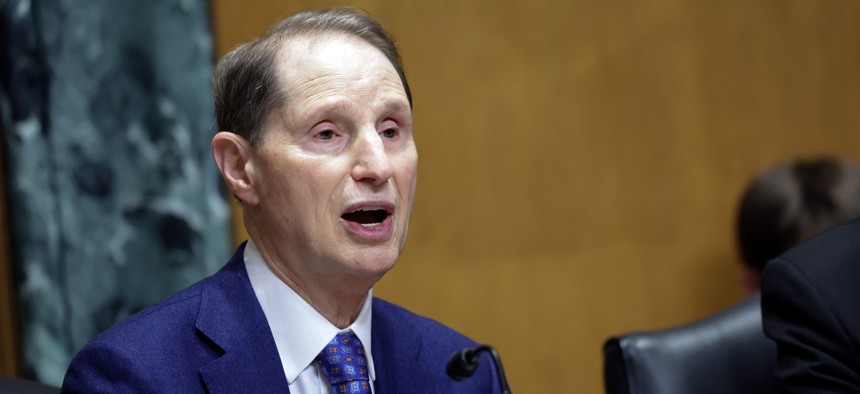Senate Dems seek funds for UI administration

Sen. Ron Wyden (D-Ore.) chairs a hearing of the Finance Committee, April 7, 2022. Kevin Dietsch/Getty Images
Twenty Senate Democrats told top appropriators that a lack of funding over the years contributed to problems in unemployment insurance during the pandemic.
Sen. Ron Wyden (D-Ore.) and 19 colleagues want Congress to fully fund unemployment insurance administration as requested by the White House for fiscal year 2023.
"Without robust administrative funding, state workforce agencies will struggle to provide UI benefits efficiently to jobless workers and to protect the integrity of the program," they wrote in a May 5 letter to leaders of the Senate Appropriations subcommittee that fund the Labor Department, Sens. Patty Murray (D-Wash.) and Roy Blunt (R-Mo.).
The Biden administration is asking for about $3.4 billion for unemployment insurance. As part of the budget request, the administration is looking to overhaul how the federal government funds states for administration, something it says would be "the first comprehensive update in decades." This update is something the administration also asked for in the budget request for fiscal year 2022.
Wyden and his colleagues point specifically to administrative funding – about $3.2 billion in grants to states to administer state unemployment laws and $168 million for national activities to support the administration of unemployment insurance.
The senators say that this funding requested by the Biden administration would enable the Labor Department to "update its outdated funding assumptions and provide states with sufficient funds" and fund national administrative updates.
The authors said state-level agencies were overwhelmed at the start of the pandemic and the impact on Americans trying to claim their benefits, writing "part of the reason states were so unprepared to deal with this surge of claims was decades of underinvestment in UI administration."
"Because Congress has consistently failed to appropriate sufficient administrative funding for the program, the Department of Labor is forced to allocate funding to states using outdated cost assumptions that don't reflect the actual cost of administering UI, leaving state workforce agencies operating on shoestring budgets," they continued.
That underfunding, lawmakers said, leaves state agencies understaffed, saddled with old tech and vulnerable to fraud.
Although state agencies did get some relief via additional administrative funding in several pandemic relief legislation packages, they used that for "short-term needs" and will need "strong annual funding" for long-term improvements, the letter states.
Other parts of the White House's budget request for unemployment for the next fiscal year would go towards program integrity, including tech modernization, as well as the Labor Department's inspector general.



